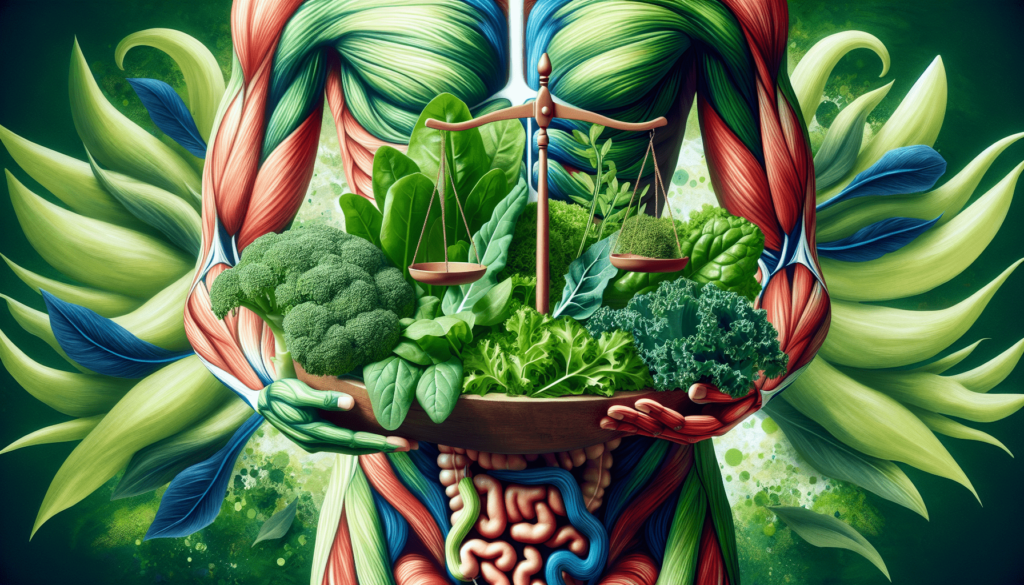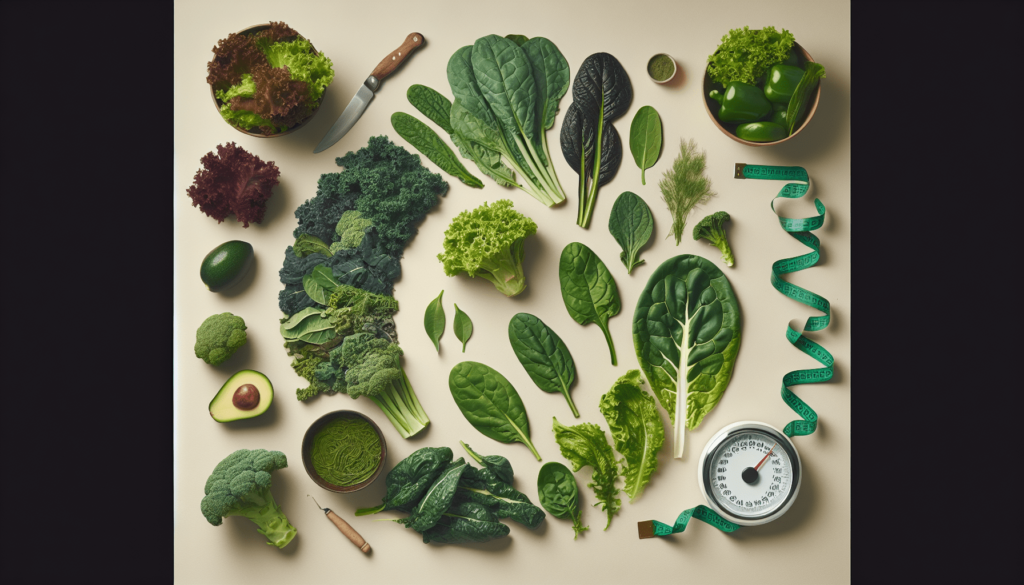Embark on a journey towards a healthier you with the power of leafy greens. In the world of healthy living, where food becomes your medicine and prevention takes center stage, leafy greens are the superheroes of the nutrient-rich superfood realm. From combating heart issues to boosting brainpower and aiding digestion, these green wonders hold the key to a vibrant life. Discover how they can detoxify your body and manage your weight, while unraveling the mysteries surrounding popular detox trends. By making informed choices and embracing the delicious recipes and actionable tips provided, you hold the power to transform your life, reduce stress, control inflammation, and elevate your mood. Get ready to unlock a future brimming with vitality, with the help of the mighty Green Goddess: leafy greens.

Introduction to Leafy Greens
Leafy greens are a category of vegetables characterized by their green leaves and high nutritional value. They are packed with vitamins, minerals, and antioxidants, making them a powerhouse of health benefits. Leafy greens are not only delicious but also incredibly versatile in cooking. In this article, we will explore the nutritional value of leafy greens, their importance in detoxification, and their role in weight management.
What are leafy greens?
Leafy greens refer to a variety of vegetables that are primarily defined by their leafy tops. These include spinach, kale, collard greens, Swiss chard, and arugula, among others. These vegetables are known for their dark green color, which is a result of chlorophyll, a pigment responsible for photosynthesis. Leafy greens come in different textures and flavors, ranging from mild and delicate to earthy and robust.
Nutritional value of leafy greens
Leafy greens are nutritional powerhouses, with a wide range of vitamins, minerals, and antioxidants. They are rich in vitamins A, C, and K, as well as folate, iron, calcium, and potassium. These vegetables are also low in calories and fat while being high in fiber and water content. Additionally, leafy greens contain various phytochemicals, which are natural compounds that have been shown to have numerous health benefits.
Importance of leafy greens in detoxification
One of the key benefits of leafy greens is their role in detoxification. Leafy greens are rich in fiber, which aids in digestion and helps to remove waste products from the body. The high water content in these vegetables also helps to flush out toxins from the system. Moreover, leafy greens contain various detoxifying compounds that support liver function, thereby enhancing the body’s natural detoxification process.
Role of leafy greens in weight management
Leafy greens are an excellent choice for those looking to manage their weight. These vegetables are low in calories while being high in nutrients, making them a perfect addition to a balanced diet. The fiber content in leafy greens promotes satiety, helping you feel fuller for longer and reducing cravings. Additionally, leafy greens are rich in vitamins and minerals, which are essential for overall health and well-being. Furthermore, the metabolism-boosting properties of leafy greens can support fat burning and weight loss efforts.
Top Leafy Greens for Detoxification
When it comes to choosing leafy greens for detoxification, some options stand out in terms of their nutritional profile and detoxifying properties. Let’s take a closer look at five of the top leafy greens for detoxification:
Spinach
Spinach is a popular leafy green known for its versatility and health benefits. It is an excellent source of vitamins A, C, and K, as well as folate, iron, and calcium. Spinach contains chlorophyll, which helps to cleanse and detoxify the body. It is also rich in antioxidants that combat oxidative stress and reduce inflammation.
Kale
Kale has gained popularity in recent years for its exceptional nutritional value. It is packed with vitamins A, C, and K, as well as folate, iron, and calcium. Kale contains glucosinolates, which are sulfur-containing compounds that support detoxification processes in the body. It is also a great source of antioxidants, helping to protect against cellular damage.
Collard greens
Collard greens are a leafy green vegetable that is often used in Southern cuisine. They are rich in vitamins A, C, and K, as well as folate, calcium, and potassium. Collard greens contain compounds called isothiocyanates, which have been shown to support the detoxification of harmful substances in the body. They are also high in fiber, aiding in digestion and toxin elimination.
Swiss chard
Swiss chard is a vibrant and flavorful leafy green that is packed with nutrients. It is an excellent source of vitamins A, C, and K, as well as magnesium and potassium. Swiss chard contains unique antioxidants called betalains, which have been shown to have anti-inflammatory and detoxifying properties. It also provides fiber for improved digestion and toxin elimination.
Arugula
Arugula is a peppery leafy green that adds a burst of flavor to salads and dishes. It is rich in vitamins A, C, and K, as well as folate and calcium. Arugula contains detoxifying compounds known as glucosinolates, which are converted into sulforaphane in the body. Sulforaphane has been shown to support liver detoxification processes and reduce the risk of chronic diseases.
Benefits of Leafy Greens in Detoxification
Leafy greens offer a range of benefits when it comes to detoxification. Let’s explore some of the key reasons why these vegetables are essential for supporting the body’s natural detox processes:
High fiber content for improved digestion
One of the primary benefits of leafy greens in detoxification is their high fiber content. Fiber helps to improve digestion by promoting regular bowel movements and preventing constipation. This aids in the removal of waste products and toxins from the body. Including leafy greens in your diet can help ensure a healthy and efficient digestive system.
Rich in antioxidants to combat free radicals
Leafy greens are loaded with antioxidants, which are essential in the detoxification process. Antioxidants help to combat free radicals, which are unstable molecules that can cause damage to cells. The antioxidants found in leafy greens, such as vitamins A, C, and E, neutralize free radicals and protect the body from oxidative stress. This, in turn, supports the detoxification process by reducing cellular damage.
Detoxifying properties to support liver function
The liver plays a crucial role in detoxification, and leafy greens provide the necessary nutrients to support its function. These vegetables contain compounds that enhance the liver’s ability to break down toxins and eliminate them from the body. Leafy greens, such as kale and collard greens, contain sulfur compounds that promote liver detoxification processes, while arugula and spinach provide chlorophyll, which helps to cleanse the liver.
Natural diuretic effect for elimination of toxins
Leafy greens have a natural diuretic effect, meaning they promote increased urine production. This helps to flush out toxins and waste products from the body, supporting the detoxification process. The diuretic effect of leafy greens can also aid in reducing water retention and bloating. Including these vegetables in your diet can help maintain a healthy fluid balance and promote detoxification.
Alkalizing effect on the body to promote balance
Many leafy greens have an alkalizing effect on the body, helping to restore pH balance. The standard Western diet often creates an acidic environment in the body, which can hinder detoxification and overall health. Leafy greens, such as Swiss chard and kale, contain alkalizing minerals that help neutralize acidity and promote a more balanced internal environment. This is essential for optimal detoxification and overall well-being.
Leafy Greens for Weight Management
In addition to their detoxifying properties, leafy greens are also beneficial for weight management. Let’s explore how these vegetables can support weight loss and healthy weight maintenance:
Low in calories and high in nutrients
Leafy greens are incredibly low in calories while being packed with essential nutrients. This makes them an excellent choice for those looking to manage their weight. You can enjoy generous servings of leafy greens without consuming excess calories, allowing you to feel satisfied and nourished.
High fiber content for increased satiety
The fiber content in leafy greens is essential for weight management. Fiber adds bulk to your meals, promoting feelings of fullness and reducing hunger. By including leafy greens in your diet, you can increase the volume of your meals without adding excessive calories. This can help prevent overeating and aid in weight control.
Slow-release carbohydrates for stable blood sugar levels
Leafy greens contain slow-release carbohydrates, which are beneficial for maintaining stable blood sugar levels. Unlike refined carbohydrates that cause rapid spikes and crashes in blood sugar, the carbohydrates in leafy greens are digested and absorbed more slowly. This promotes a steady release of glucose into the bloodstream, providing sustained energy and reducing cravings for sugary snacks.
Rich in vitamins and minerals to support overall health
Leafy greens are a fantastic source of vitamins and minerals that are essential for overall health. When you are on a weight management journey, it is crucial to ensure that your body receives adequate nutrition. Leafy greens, such as spinach and kale, provide a wide array of vitamins and minerals, including vitamins A, C, and K, as well as calcium, iron, and magnesium. These nutrients support various bodily functions and contribute to overall well-being.
Boost metabolism and fat burning
Certain leafy greens, such as kale and spinach, have been shown to have metabolism-boosting properties. They contain compounds that can increase fat burning and enhance metabolic rate. By incorporating these vegetables into your diet, you can potentially support your weight management efforts and increase calorie expenditure.

Incorporating Leafy Greens into Your Diet
Now that you understand the numerous benefits of leafy greens, let’s explore some ways to incorporate these vegetables into your daily meals:
Raw in salads and smoothies
One of the easiest and most popular ways to enjoy leafy greens is to eat them raw in salads and smoothies. You can add a handful of spinach, kale, or arugula to your favorite salad for an extra nutrient boost. Leafy greens can also be blended into smoothies along with other fruits and vegetables for a refreshing and healthy beverage.
Sauteed or steamed as a side dish
Leafy greens can also be sauteed or steamed as a delicious side dish. Adding a drizzle of olive oil and some garlic to a pan of greens can enhance their flavor while retaining their nutritional value. This cooking method allows the greens to retain their vibrant color and texture.
Blended into soups and sauces
Another way to incorporate leafy greens into your diet is by blending them into soups and sauces. You can add a handful of spinach or kale to your favorite soup recipe or blend them into a homemade sauce for pasta or vegetables. This not only adds a nutritious boost to your meals but also enhances the flavor and texture of the dish.
Added to omelets or stir-fries
Leafy greens can be a fantastic addition to omelets or stir-fries. You can saute a handful of spinach or kale and add it to your omelet mixture for a healthy and flavorful breakfast. Similarly, you can toss some Swiss chard or collard greens into a stir-fry for a nutritious and satisfying meal.
Substitute for bread or tortilla wraps
For those looking to reduce their carbohydrate intake, leafy greens can be used as a substitute for bread or tortilla wraps. Large leafy greens, such as collard greens or Swiss chard, can be used as a wrap for sandwiches or burritos. This adds an extra layer of nutrients while reducing calorie and carbohydrate content.
Tips for Maximizing Nutrient Absorption
To fully maximize the benefits of leafy greens, here are some tips for enhancing nutrient absorption:
Pair leafy greens with healthy fats
Certain nutrients in leafy greens, such as vitamins A, D, E, and K, are fat-soluble, meaning they require fat for proper absorption. By pairing leafy greens with healthy fats, such as avocado, olive oil, or nuts, you can enhance the absorption of these important nutrients. Combining a source of fat with your leafy green salad or sauteed greens can ensure you reap all the nutritional benefits.
Include vitamin C-rich foods for enhanced iron absorption
Leafy greens are also a good source of iron, but the absorption of non-heme iron, which is found in plant-based foods, can be enhanced by consuming vitamin C-rich foods at the same time. Pair your leafy greens with citrus fruits, tomatoes, bell peppers, or strawberries to boost iron absorption. This combination can benefit those following a plant-based diet or looking to increase their iron intake.
Avoid overcooking to retain nutrients
To retain the maximum amount of nutrients in leafy greens, avoid overcooking them. Overcooking can cause a loss of vitamins and minerals. Instead, aim to lightly steam or saute your leafy greens until just wilted. This way, they will retain their vibrant color and nutritional value.
Choose organic or locally sourced greens
When possible, opt for organic or locally sourced leafy greens. Organic greens are grown without the use of synthetic pesticides, which can be harmful to health. Locally sourced greens are often fresher and have undergone less transportation, leading to better nutrient retention. Supporting local farmers also reduces the carbon footprint associated with long-distance food transportation.
Rotate the types of leafy greens for a variety of nutrients
To ensure a well-rounded intake of nutrients, rotate the types of leafy greens you consume. Different leafy greens offer a variety of vitamins, minerals, and antioxidants. By varying your leafy greens, you can broaden your nutrient intake and prevent boredom in your meals.
Precautions and Considerations
While leafy greens offer numerous health benefits, there are some precautions and considerations to keep in mind:
Allergies or sensitivities to specific leafy greens
Some individuals may have allergies or sensitivities to specific types of leafy greens. It is important to be aware of any adverse reactions or symptoms that may occur after consuming certain greens. If you experience any discomfort or allergic symptoms, such as itching, swelling, or difficulty breathing, consult a healthcare professional.
Potential interactions with certain medications
Certain leafy greens, such as kale and Swiss chard, contain compounds called oxalates, which can bind to calcium and form oxalate crystals. These crystals can potentially contribute to the development of kidney stones in individuals predisposed to them. If you have a history of kidney stones or are taking medications that can interact with leafy greens, consult your healthcare provider for guidance on safe consumption.
Washing leafy greens thoroughly to remove pesticides
If you choose conventionally grown leafy greens, it is essential to wash them thoroughly before consumption. Leafy greens can contain traces of pesticides, which can be harmful to health if ingested. Rinse your greens under cool running water and consider using a produce wash to remove any pesticide residues.
Balancing leafy greens with other food groups for a well-rounded diet
While leafy greens offer numerous health benefits, it is important to balance their consumption with other food groups to ensure a well-rounded diet. Leafy greens should be part of a diverse and balanced meal plan that includes a variety of fruits, vegetables, whole grains, lean proteins, and healthy fats. This will provide the body with a wide range of nutrients needed for optimal health.
Moderation in consumption to avoid excessive intake of certain nutrients
While leafy greens are generally beneficial, certain individuals may need to exercise moderation in their consumption. For example, individuals taking blood thinning medications, such as warfarin, should be cautious with leafy greens high in vitamin K, as they can interfere with the medication’s effectiveness. Additionally, excessive consumption of certain leafy greens, such as spinach and Swiss chard, can lead to a buildup of oxalates in the body. If you have any concerns about your leafy green intake, consult a healthcare professional for personalized advice.
Conclusion
Incorporating leafy greens into your diet is a fantastic way to support detoxification and weight management. These nutrient-dense vegetables offer a wide range of health benefits, including improved digestion, antioxidant protection, liver support, toxin elimination, and metabolic enhancement. By including leafy greens in your daily meals, you can nourish your body, boost your overall health, and promote long-term well-being. Embrace the power of leafy greens as a staple in your balanced diet and unlock a future brimming with vitality.

